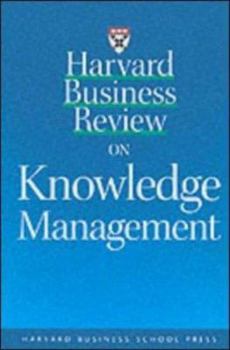Knowledge Management
Highlights the thinking and practical applications that are defining the field of knowledge management. This book includes Peter Drucker's prophetic The Coming of the New Organization and Ikujiro Nonaka's Knowledge-Creating Company.
Format:Paperback
Language:English
ISBN:0875848818
ISBN13:9780875848815
Release Date:September 1998
Publisher:Harvard Business Review Press
Length:223 Pages
Weight:0.72 lbs.
Dimensions:0.7" x 5.8" x 8.1"
Customer Reviews
5 ratings
If KM seems expensive, try ignorance
Published by Thriftbooks.com User , 20 years ago
I read this book when it was first published in 1998 and recently re-read it, curious to see how well it has held up since then. It has done so to a remarkable extent. Again, I am reminded of Derek Bok's observation "If you think education is expensive, try ignorance." This is one in a series of several dozen volumes which comprise the "Harvard Business Review Paperback Series." Each offers direct, convenient, and inexpensive access to the best thinking on the given subject in articles originally published by the Harvard Business Review. I strongly recommend all of the volumes in the series. The individual titles are listed at this Web site: www.hbsp.harvard.edu. The authors of various articles are among the world's most highly regarded experts on the given subject. All of the volumes have been carefully edited. An Executive Summary introduces each selection. Supplementary commentaries are also provided in most of the volumes, as is an "About the Contributors" section which usually includes suggestions of other sources which some readers may wish to explore. In this volume, we are provided with a variety of perspectives on knowledge management: Peter F. Drucker on "The Coming of the New Organization," Ikujiro Nonaka on "The Knowledge-Creating Company," David A. Garvin on "Building a Learning Organization," Chris Argyris on "Teaching Smart People How to Learn," Dorothy Leonard and Susaan Straus on "Putting Your Company's Whole Brain to work," Art Kleiner and George Roth on "How to Make Experience Your Company's Best Teacher," John Seely Brown on "Research That Reinvents the Corporation," and James Brien Quinn, Philip Anderson, and Sydney Finkelstein on "Managing Professional Intellect: Making the Most of the Best." Listing the article titles correctly indicate the nature and scope of the specific subjects offered. Quite true, some of the material is dated and inevitably so, given the elapsed time since the articles were published in the Harvard Business Review. However, in my opinion, the principles advocated and the core strategies recommended remain relevant to the contemporary marketplace. For example, Drucker notes that "to remain competitive -- maybe even to survive -- businesses will have to convert themselves into organizations of knowledge specialists." Garvin presents an especially informative analysis of Xerox's six-step problem-solving process which addresses questions to be answered, expansion/divergence issues, contraction/convergence issues, and "next steps" after implementation. Leonard and Straus rigorously examine the Myers-Briggs Type Indicator process, including within their narrative a brilliant overview of the MBTI©. Indeed, readers are provided with rock-solid material throughout each article. For less than the cost of breakfast in an upscale Manhattan restaurant, each volume in this series provides an intellectual feast. It remains for each reader to determine, of course, which of the volumes will be most nutritious
A good introduction
Published by Thriftbooks.com User , 24 years ago
The Harvard Business Review Series is a collection of reprints of some classic articles from the journal. There are some classic, thought provoking pieces in this book.In light of the current Japanese recession, it is interesting to reread Nonaka's review of Japanese group methods for promoting creativity in the corporation. He argues that it is a western idea that knowledge is 'hard', or can be digested into records in a computer. He describes cycles of tacit to explicit knowledge that a learning group experiences. I enjoyed his characterization of the senior manager as a romantic pursuing ideals. In the next wave of eBusiness will the companies that thrive be able to leverage the tacit knowledge in the current operational model of the internet?This is a good starting reference on this topic.
A simple, but direct approach to a subject that is academic
Published by Thriftbooks.com User , 25 years ago
Having read other titles that treat this subject either partially or fully, this strikes me as the most simple and direct one in approaching the subject of knowledge management. While some authors have treated the subject as an academic exercise, the various contributors to this title have cleverly demonstrated the practicality of this subject in today's changing business environment.
Ideal Intro To A Very Intangible Topic
Published by Thriftbooks.com User , 25 years ago
While other facets of managment consulting will ultimately yield to lower-cost technology tools, or consultants, KM shall reign as the ultimate value-added analysis. That was my hypothesis before buying this book, and it has only been proven true. The essays in the book range from esoteric to the executable, and include valuable case studies to punctuate the themes. Knowledge Management means so many things, that it can come to mean nothing. This book does an excellent job of providing some metes and bounds to the topic and to stimulate thinking around important organizational and operational issues.But don't get it and expect to be an "instant expert." This is an overview, albeit an excellent one.
Excellent, clear, practical summary of the subject
Published by Thriftbooks.com User , 25 years ago
An excellent summary of a wide range of topics that can be grouped under the heading 'Knowledge Management'. The content is stimulating and full of practical applications.





